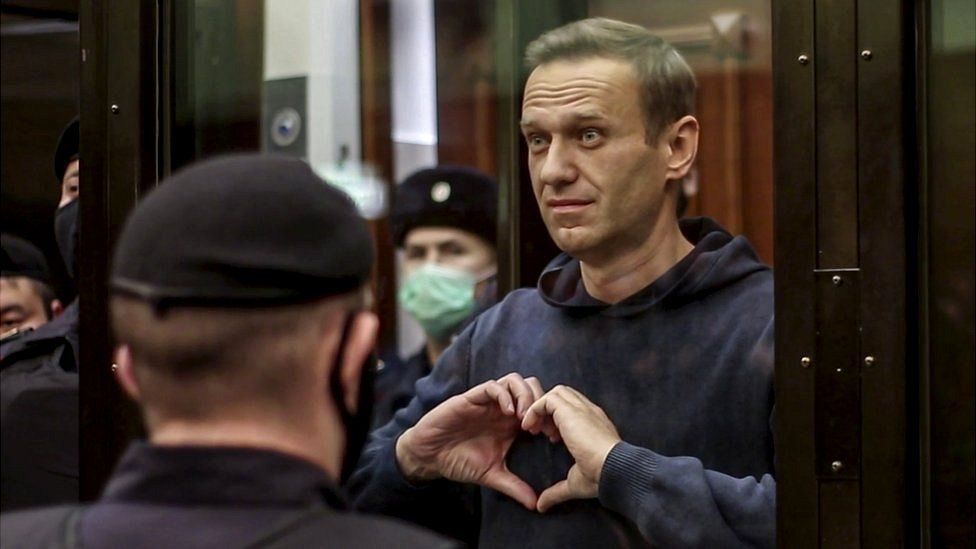His name was first heard with the anti-Putin blog: Who is Alexey Navalny?
The political life of opposition leader Navalny, who paid a heavy price for standing against Putin, was arrested many times, was brought to trial, imprisoned, and subjected to physical violence, is full of struggle.

Anti-Corruption Fund founder Alexei Navalny, one of Russian President Vladimir Putin's most publicly known opponents, made his name known in 2008 with blog posts exposing corruption and abuse of power in Russian politics and public companies.
During this period, Navalny, whose main profession is a lawyer, began to identify gaps in the company and public expenditures by purchasing small shares of large oil companies and banks and announcing them to his followers.
In the process, he became one of the opposing voices of the ruling United Russia Party and became one of the sharpest critics of then-party leader Vladimir Putin with his anti-corruption campaigns.
Navalny, who called on his followers to vote for any party other than the ruling party before the parliamentary elections in 2011, was arrested during a protest in front of the parliament building and spent 15 days in prison.
Alexei Anatolievich Navalny (born 4 June 1976) is a Russian opposition leader, lawyer, and anti-corruption activist. He has organised anti-government demonstrations and run for office to advocate reforms against corruption in Russia, and against president Vladimir Putin (who avoids referring directly to Navalny by name) and his government. Navalny was a Russian Opposition Coordination Council member. He is the leader of the Russia of the Future party and founder of the Anti-Corruption Foundation (FBK).
The United Russia Party suffered a loss of votes in the elections in which allegations of irregularities were made. After his release, Navalny was in the front row of the huge protest demonstration held after the election, attended by 120 thousand people.
Putin, who won the presidential elections in 2012, launched an investigation into Navalny's past work. Navalny, who was sentenced to five years in prison for a corruption crime in Kirov, was released by a higher court the next day.
The case was brought to the European Court of Human Rights (ECHR) in the following years.
He gave his first test in the Moscow mayoral elections
Despite the legal process, Navalny was allowed to participate in the Moscow mayoral elections in 2013 and finished second after Putin's candidate Sergei Sobyanin, received 27 percent of the votes.
The result achieved by the politician, who tried to make his voice heard only through social media and the internet, without the support of the traditional media under the control of the Kremlin, was described as a great success by many circles.
2017 was an eventful year for Navalny
2017 was a particularly active year for the opposition politician who aimed for the presidency, drawing strength from this success.
Navalny, who took the lead in the massive anti-corruption demonstrations that started in dozens of cities across the country in February 2017 and in which thousands of people were detained, was arrested on the grounds that he played a provocative role in Prime Minister Dmitry Medvedev due to his articles revealing his connection with the billion-dollar real estate empire. Navalny, who was released after 15 days, opened his election office and started campaigning for the presidential election.
In March 2017, he was attacked on the street. While he was meeting with the public in Siberia, a passerby sprayed Navalny's face with green antiseptic spray.
Despite all his efforts, he was not allowed to participate in the 2018 presidential elections as a candidate. The opposition leader called for a boycott of the election.
He had previously been hospitalized on suspicion of poisoning.
Navalny, who was arrested as a result of a protest in August 2019 and sentenced to 30 days in prison, suddenly fell ill and was hospitalized. Navalny blamed the government for allegedly being poisoned in prison.
Navalny, who was born near Moscow on June 4, 1976, currently lives in Moscow with his wife and two children. Navalny is also the leader of the Future of Russia Party, which is yet to be officially registered by the Russian Ministry of Justice.
Navalny and his supporters, who were arrested many times, went to trial, were imprisoned, and attacked, but did not give up on their fight in politics, were recently added to the "foreign agent" list. Navalny's office was searched at the end of 2020 for alleged money laundering.
Stands out with its nationalist identity
Navalny, who was especially influential on young voters with his sharp, sarcastic language and the modern communication tools he used, attracted attention with his nationalist views.
Emphasizing that he would not leave Russia and continue his struggle in his country, unlike other opposition politicians, the opposition leader's words, "The truth is that Crimea is now a part of Russia. Crimea is ours" after Russia's annexation of Crimea, raised questions, especially among the liberal segment.
